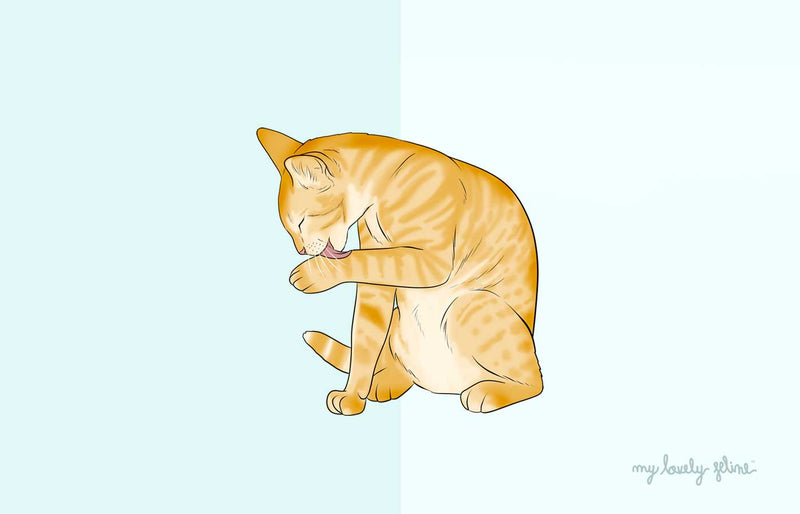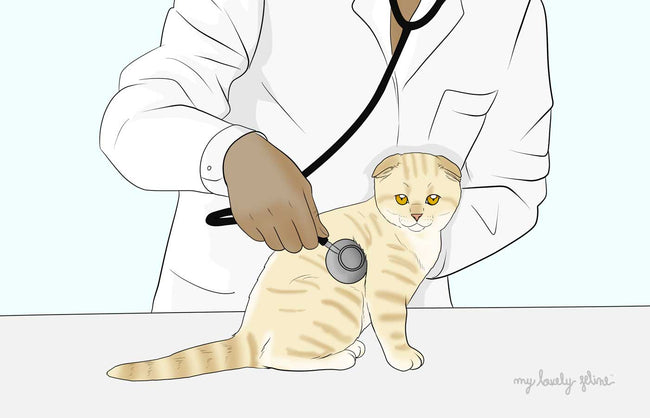—Veterinarian 🇺🇸
|
Grooming is a normal behavior for cats; It helps them to keep their coats clean and silky smooth. |
How Much is Too Much?
A lack of grooming is just as much of a concern as overgrooming is. Sometimes overweight, elderly, or sick cats will not groom themselves as much as they should and as a result, their coat can appear greasy, matted, and unkempt.
If your cat is excessively grooming, their coat will typically have patches of thin hair or hair loss. When severe, a cat that is overgrooming themselves may experience sores or skin infections from the constant licking and grooming. If overgrooming, your cat may also experience hairballs from all of the excessive hair ingestion.
As with most conditions in cats, overgrooming has many potential causes, outlined below. Your veterinarian can help you decide which cause may be affecting your cat and the best treatment plans.
Skin Infections/Diseases
Skin infections can be the primary cause or a secondary outcome of overgrooming in cats. Skin diseases in cats such as allergies can also lead a cat to overgroom themselves.
Pain
Cats aren’t able to verbally tell us they are uncomfortable or in pain. Sometimes, when cats are in pain or discomfort, overgrooming can be a visual clue. Some older cats experiencing arthritis or muscular pain may repetitively lick themselves in the area they are feeling pain (usually over a joint like a wrist, elbow, or knee).
Cats that may be experiencing abdominal pain from gastrointestinal issues, or other organ pain may repeatedly lick themselves on their sides or belly.
Your veterinarian can determine if there is any evidence of pain that may be causing your cat’s overgrooming behavior.
Depending on the source and cause of the pain, additional diagnostics may be recommended such as x-rays and bloodwork. If pain is the cause of overgrooming, pain medications may be prescribed.
Anxiety/Behavioral
I think everyone can agree that cats are very sensitive creatures. Sometimes life changes in a cat’s environment or life can greatly affect their mental health.
Anxiety can present itself in a multitude of different ways in cats, one of the most common presentations being overgrooming.
A life change such as a reduction or addition of an animal or human family member into the household can be very stressful for cats. Additionally, if other things are hectic in a cat’s life (such as moving, renovation, traveling, etc) it can also cause anxiety.
Anxiety can be difficult to diagnose in cats. Cats suffering from anxiety may convey other behaviors such as urinating outside of the litterbox, a change in feeding/drinking habits, or any abnormal behaviors. Sometimes, overgrooming can be the only sign of anxiety.
If there are other signs of anxiety, it is usually safe to say anxiety is playing a role in a cat’s overgrooming habits. If there are no other signs of anxiety, veterinarians rule out other causes of overgrooming by making sure there are no underlying skin diseases or pain before they decide if anxiety is the sole cause.
Anxiety in cats can be treated with environmental modification (providing a safe space for your cat away from their triggers), calming supplements (such as Feliway, Composure, Zylkene, probiotics, calming diets, etc), and sometimes prescription anxiety medications.
Q&A
Q: If arthritis is causing overgrooming in my cat, what else can we do besides pain medications?
A: There are many ways to treat pain in cats. While anti-inflammatory medications and other prescription pain medications are the mainstays of treatment, many other modalities have merit. These include acupuncture, laser therapy, massage, rehabilitation/physical therapy, and herbal pain relief.
Q: If anxiety is the cause of my cat’s overgrooming, do they need medication?
A: Just like people, some cats experience constant anxiety that may need a maintenance prescription anxiety medication. Other cats experience situational anxiety, which may be resolved with environmental modification and/or short-term anxiety medication and/or calming supplements.
Article by Dr. Kimberly Couch 👩⚕️
Veterinarian




